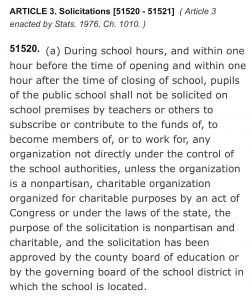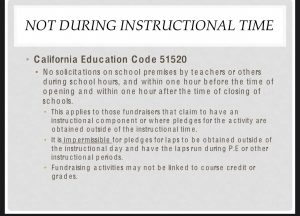
Could you imagine a for profit company being given privilege to students during instructional time to teach their own curriculum, not acknowledged by the school district or state, diverting a students time at school for their own corporate agenda? We need to look no further than the recent congressional hearings that took place with Juul. Not only did Juul have it’s own set of curriculum for students, which we have since learned representatives said the e-cigarettes were ‘totally safe,’ in addition, schools accepted money from Juul. This is why as parents and educators, we need to be especially mindful about who has access to our most vulnerable population; our children. Spoiler Alert: We’re not only talking about Juul.
What happens when we replace the company Juul with any fundraiser held during instructional minutes at school? While many of us are familiar with what fundraising is, we are not so familiar with regulations or policies that govern fundraisers. Luckily, if you are in a state like California, Educational Code 51520 is mindful of protecting instructional time.
 Protecting instructional minutes means that fundraisers do not interfere and disrupt students regular daily schedule.
Protecting instructional minutes means that fundraisers do not interfere and disrupt students regular daily schedule.Many school districts already have great policies and guides in place to empower leadership and parent organizations to make decisions vested in the best interest of students. School districts need to adhere to the law. In fact, Los Angeles Unified School District has created a guide for school leadership and volunteer groups to make sure all adhere to the law.

“Not During Instructional Time” (slide 12/27 of LAUSD’s Fundraising Policy) highlights that:
- this applies to those fundraisers that claim to have an instructional component
- P.E. is still instructional time (aka running laps during class for outside pledges)
We should always use caution when a company tells school leaders they are teaching character lessons to students. As Faith Boninger, a research associate at the National Education Policy Center said, “A lot of commercial programs that try to get into schools will claim to be consistent with Common Core, claim to be bringing education values, but they’re not promoting the democratically agreed upon curriculum. They’re coming in as opportunists.”
I’m certainly not advocating that we should banish all school fundraisers. I’m simply saying that we should not only adhere to the law, but be mindful of who we give access to our children during the school day. School fundraisers can boost school spirit while raising funds for school. Fundraising is a part of public school culture, one in which, for many schools in California generates funds to hire specialists and offer enrichment classes. Donations poor in throughout the year from Educational Foundations and PTA’s with dedicated volunteers that collect money from parents and community members in hopes of providing a quality educational experience for students. The problem occurs when organizations aren’t aware of the law. That’s when the school district needs to to step up and empower those groups or be held accountable.
